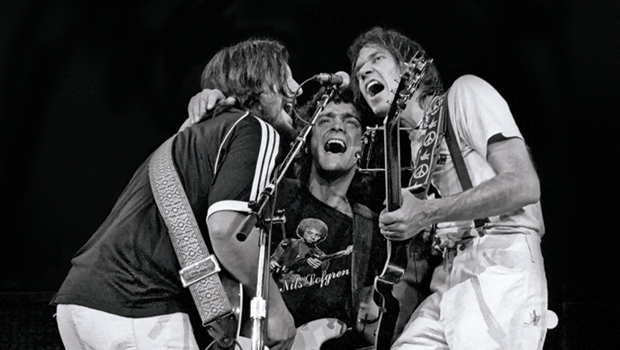Excerpt: Five Questions with Crazy Horse Guitarist Frank “Poncho” Sampedro

The following is an excerpt from the February 2013 issue of Guitar World. We caught up with Crazy Horse guitarist Frank “Poncho” Sampedro to discuss Psychedelic Pill, his working relationship with Neil Young and more.
In a way it could be said that Psychedelic Pill is Neil Young and Crazy Horse at your most Neil Young and Crazy Horse. The first song alone, “Driftin’ Back,” lasts for almost a half hour. How does something like that come together?
For that one, Neil just started playing it and we all joined in. I think right before we began, he said something like, “You know, when we go to the verse it goes to these changes…” and he showed us. Nobody really knew when that was gonna happen, but we just followed along. And there might have been some rough spots. I might have dropped my guitar down a couple times. [laughs] But other than that, that was it. That’s the first take. For years I’ve been telling people that when we get together and jam, it’s just like that. But it was never recorded.
So the version that we hear on the album is the first time you ever played it—and even heard it—as a band?
Yeah. That’s the record. That’s what we sound like when we haven’t seen each other for a while!
This is Neil’s first record with Crazy Horse in a decade, which is the longest stretch of time you guys have had between albums together. Did you ever wonder whether there would be another go ’round?
There are periods where you might have a little doubt in your heart. But I always felt it was going to happen. Because we’re a band, and we play. I was retired for almost two years before we started doing this, and it took a little bit of my energy to think, Do I really want to go and play music again? I’m pretty happy. But we’re a band, and you can’t just deny the band.
Get The Pick Newsletter
All the latest guitar news, interviews, lessons, reviews, deals and more, direct to your inbox!
Neil has a reputation for being unpredictable in terms of when and how he chooses to work with other musicians. Was that part of the impetus behind keeping up a day job?
Well, back in ’76, I remember we were working on [the Crazy Horse album] Crazy Moon, and Neil was producing and playing on it. We were in the studio working on songs, and he just took off somewhere down to Florida, or somewhere, for vacation. Then we were supposed to do this big Bicentennial tour, and our record was going to come out and he had a record that was going to come out. The next thing we knew, he came home and he had made a record with Stephen Stills and was going out on the road with him, and it was goodbye to us. And then he ended up leaving Stephen on that tour, too! From that day on, whenever I stopped working with Neil, I just got another job. I never counted on Neil for work ever again. I just said, “He’s got his own thing, and he’s gonna play with a lot of different people, and he’s gonna change his mind.” I had to be prepared to take care of myself.
How do you and Neil work together as guitarists? Is there any discussion about your parts?
Never. Never ever. He never tells me what to play. There’ll be times where he might ask, “What chord are you playing here? What are you doing?” But Neil never really tries to tell anybody what to play. A lot of times, at the end of a take, Neil will say something like, “Yeah! That’s how that one goes!” Like, I’m sure it’s not how he heard it in his head when he wrote it, but that’s how it ended up, and he just thinks, Wow, we did it!
For the full interview — plus features with Smashing Pumpkins, the Who, Converge and more — pick up the February issue of Guitar World on newsstands now, or in our online store.
Rich is the co-author of the best-selling Nöthin' But a Good Time: The Uncensored History of the '80s Hard Rock Explosion. He is also a recording and performing musician, and a former editor of Guitar World magazine and executive editor of Guitar Aficionado magazine. He has authored several additional books, among them Kurt Cobain: Montage of Heck, the companion to the documentary of the same name.
“I suppose I felt that I deserved it for the amount of seriousness that I’d put into it. My head was huge!” “Clapton is God” graffiti made him a guitar legend when he was barely 20 – he says he was far from uncomfortable with the adulation at the time
“I was in a frenzy about it being trapped and burnt up. I knew I'd never be able to replace it”: After being pulled from the wreckage of a car crash, John Sykes ran back to his burning vehicle to save his beloved '76 Les Paul











